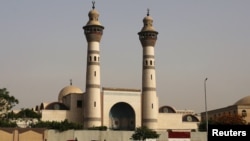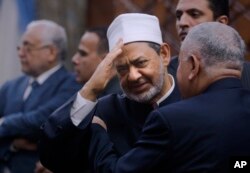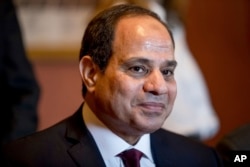Al Azhar University, Egypt's venerable seat of Islamic law, has been working to project a more modern image of Islam to counter the violent versions being espoused by Islamic State, al-Qaida and other militant groups.
Efforts by Al Azhar religious authorities to control the tenor of Islamic religious edicts or “fatwas” are part of the strategy that moderate forces are using to battle clerics espousing death and violence.
Egypt has been plagued by the efforts of militant Islamic terrorists and their “spiritual guides” to sow turmoil in the country in recent years, leaving a bloody trail of death and destruction. They have killed government officials, blown up government buildings, attacked top tourist sites, and randomly attacked police, military officers, and the country's Coptic Christian minority.
Attacks on Coptic churches, including suicide bombings at the main Coptic cathedral in Cairo last December, and more recent bombings at churches in Alexandria and Tanta on Palm Sunday, have left scores of victims and taken a toll on Egypt's fragile collective psyche. The loss of innocent lives from the deadly litany of terrorist attacks has led the government to denounce extremist Islamic clerics espousing bloodshed and violence.
Hijacking core beliefs
Hard-line clerics, like Qatar-based Egyptian Sheikh Youssef al Qaradawi, have been accused of issuing edicts, or “fatwas,” to justify the killings of police, army officers and Christians. Qaradawi claims innocence, but video of him calling for attacks on both Egyptian and Syrian government security forces are widely circulated on the internet.
Islamic extremists in the Sinai, along the border with Libya, and in a number of cities across the country have stepped up attacks against government targets in the months and years since Islamist President Mohamed Morsi was ousted by the military in July 2013. Morsi's followers call his ouster a “coup,” while supporters of the present government insist that popular protests against his rule were a new “revolution.”
Many of Morsi's supporters were jailed in the aftermath of his ouster and some were put on trial for acts of violence. His Muslim Brotherhood group was officially outlawed and many people fled the country or went underground. A series of trials have resulted in the convictions of large numbers of people.
In the wake of political and religious upheaval that has shaken Egypt's Islamic establishment, Sheikh Ahmed Tayeb of Al Azhar University, has gone on record to condemn Islamic clerics who preach violence. He insists they should not be allowed to define Islam.
“Islam,” he argues, “must not be considered a terrorist religion just because a few of its followers have hijacked some of its writings and misinterpret them to kill and shed the blood of innocent people.”
Religion and modern life
Egyptian President Abdel Fattah el Sisi has also called repeatedly for reforming or renewing Islam, most recently during a visit by Pope Francis to Cairo in April. He insists that Islam should project a less violent image to the world. His pleas have met with resistance from Islamic religious scholars in some corners, however.
Efforts to give Islam a more modern image, though, continue on various fronts. One new way clerics with ties to Al Azhar have been trying to discourage extremism is by offering religious advice to the general public at a “fatwa” booth in the Cairo metro.
Sheikh Mohamed Zaki, the head preacher at Al Azhar, tells VOA that while the core beliefs of Islam are immutable, its image or modern applications of it should fit the daily lives of people.
“Each new generation,” he says, “should benefit from the teachings of Islam, which remain unalterable as God presented them, but as flexible as the new shoots of a tree branch.”
Another more prominent way Al Azhar has clamped down on extremist clerics in recent years, has been by preventing them from preaching at mosques it controls. Al Azhar has also sought to make preachers stick to specific sermon subjects each week, without going off-topic.
But, as Sheikh Zaki noted, various hardline Islamic media outlets continue to allow firebrand clerics to broadcast their message of hate. “Media which allow such clerics to preach hate,” he says, “should be sanctioned.”







